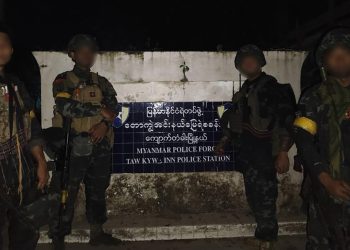YANGON — The United Nations’ highest court ruled that Myanmar must follow provisional measures to protect Rohingya Muslims from killings and other atrocities while refraining from destroying evidence related to allegations of crimes against them.
The International Court of Justice (ICJ) on Thursday issued four urgent measures related to compliance with the Genocide Convention and the implementation of those measures.
They are mostly in line with what The Gambia requested last year in its lawsuit against Myanmar.
The African nation filed a case at the court in November on behalf of the Organization of Islamic Cooperation, accusing Myanmar of committing genocide against the Rohingya. As the case could take years, The Gambia requested the court order preliminary measures against Myanmar.
More than 700,000 Rohingya fled Myanmar to neighboring Bangladesh in late 2017 after the government’s security forces launched clearance operations in northern Rakhine State in response to a series of attacks by the Arakan Rohingya Salvation Army on police outposts.
UN investigators said the operations had “genocidal intent”. Both the Myanmar government and military have denied the accusations.
Going further than the measures requested by The Gambia, the ICJ ordered Myanmar to report measures on its compliance with provisional measures in four months and then every six months thereafter.
Other measures demand Myanmar prevent all acts described in the UN Genocide Convention’s Article II (which deals with the definition of genocide), in particular killing, causing serious bodily or mental harm and preventing births, while deterring its military from committing genocide against the Rohingya and preserving evidence related to the alleged crimes.
State Counselor Daw Aung San Suu Kyi and her legal team told the court in December that the country was engaged in the repatriation of the Rohingya and promotion of ethnic reconciliation, peace and stability in Rakhine State, and making its military accountable for alleged human rights abuses.
The State Counselor told the court that any action or statement that could undermine the integrity of the criminal justice process in Myanmar should be avoided, referring to The Gambia’s attempt to sue Myanmar. She said: “Only if domestic accountability fails may international justice come into play.”
On Thursday, the ICJ president, Abdulqawi Yusuf, said the court decided Myanmar’s steps were insufficient to protect Rohingya rights invoked by The Gambia.
“In light of these considerations, the court finds that there is a real and imminent risk of irreparable prejudice to the rights invoked by The Gambia,” he said.
The World Court’s rulings are final with no appeal, but it cannot enforce them.
Kingsley Abbott, coordinator of the International Commission of Jurists’ Global Accountability Initiative, told The Irrawaddy that the order was significant, as it placed clear, legally binding obligations on Myanmar to take critical steps to protect the rights of the Rohingya under the Genocide Convention.
“It is now incumbent on the whole international community, including states, civil society and UN agencies, to urge and assist Myanmar to fulfill its obligations under the order,” he said.
In the wake of the ICJ’s ruling, the Myanmar government has made no immediate response but U Kyaw Tint Swe, the minister for the Office of the State Counselor, told the state media earlier this week that Myanmar would be fine if the ICJ approved the provisional measures.
“You don’t need to feel depressed if the measures are approved. It doesn’t mean we have lost. We will consult with legal experts on how to handle them,” he said.
A few days before the court’s ruling, Myanmar’s government-backed Independent Commission of Enquiry probing alleged human rights abuses against the Rohingya released its findings. The report denied genocidal intent by security forces against the Rohingya but admitted that “war crimes, serious human rights violations and violations of domestic law took place”.
You may also like these stories:
A Black Swan for Nobel Peace Laureate Daw Aung San Suu Kyi
Bangladesh Fortifies Island Near Myanmar With Heavy Weapons, Gunboats

















